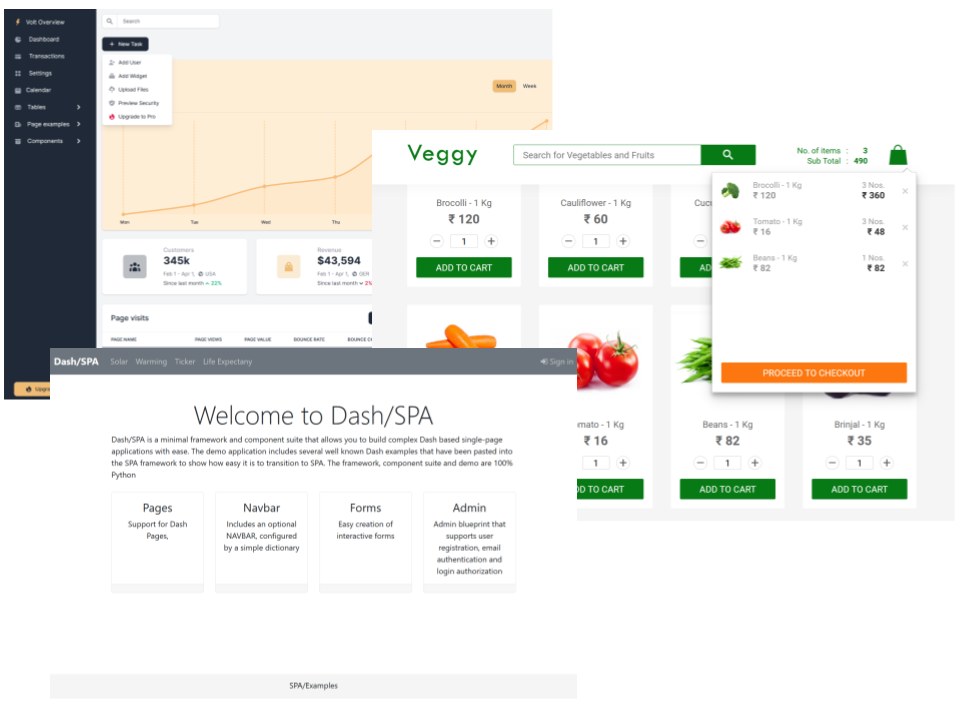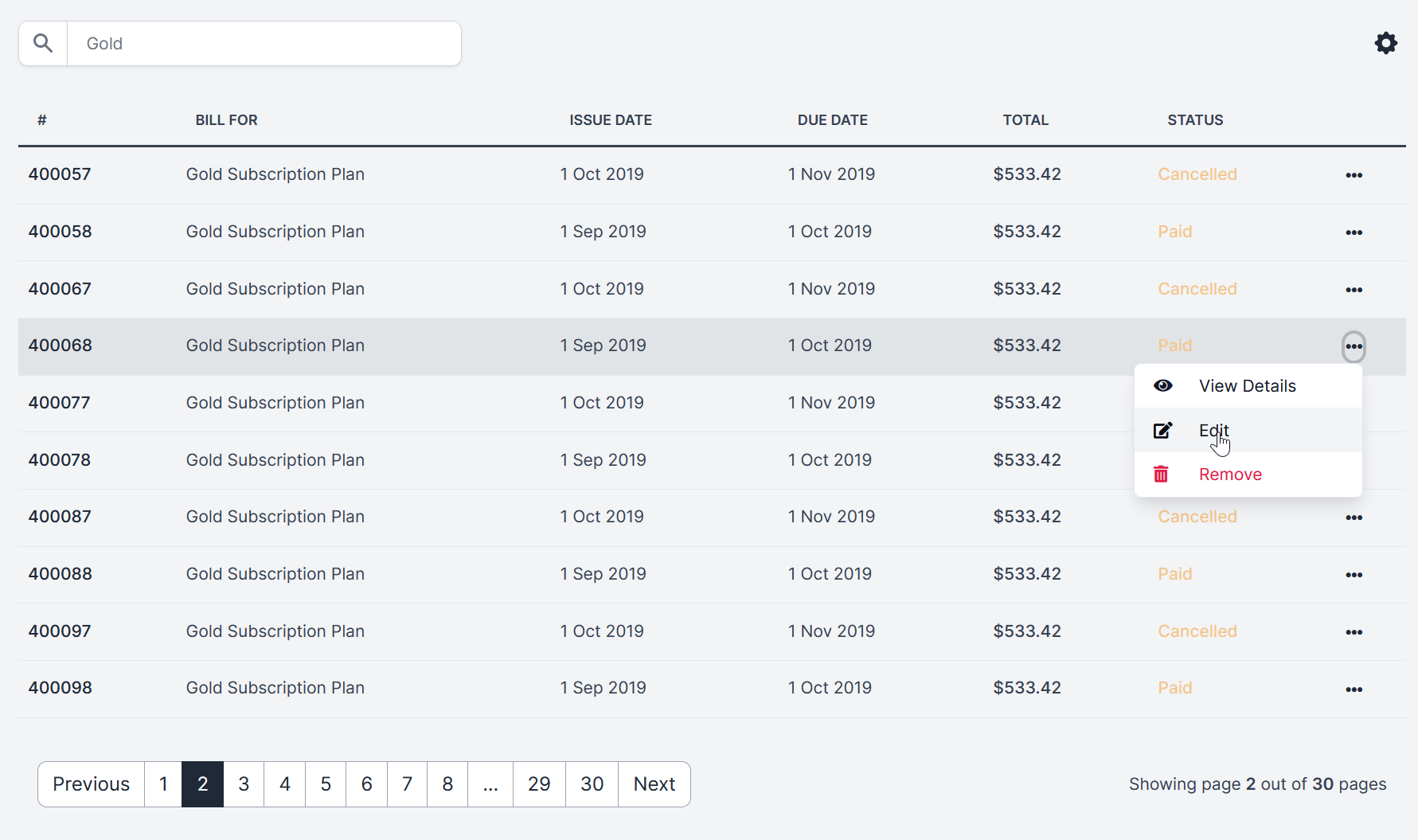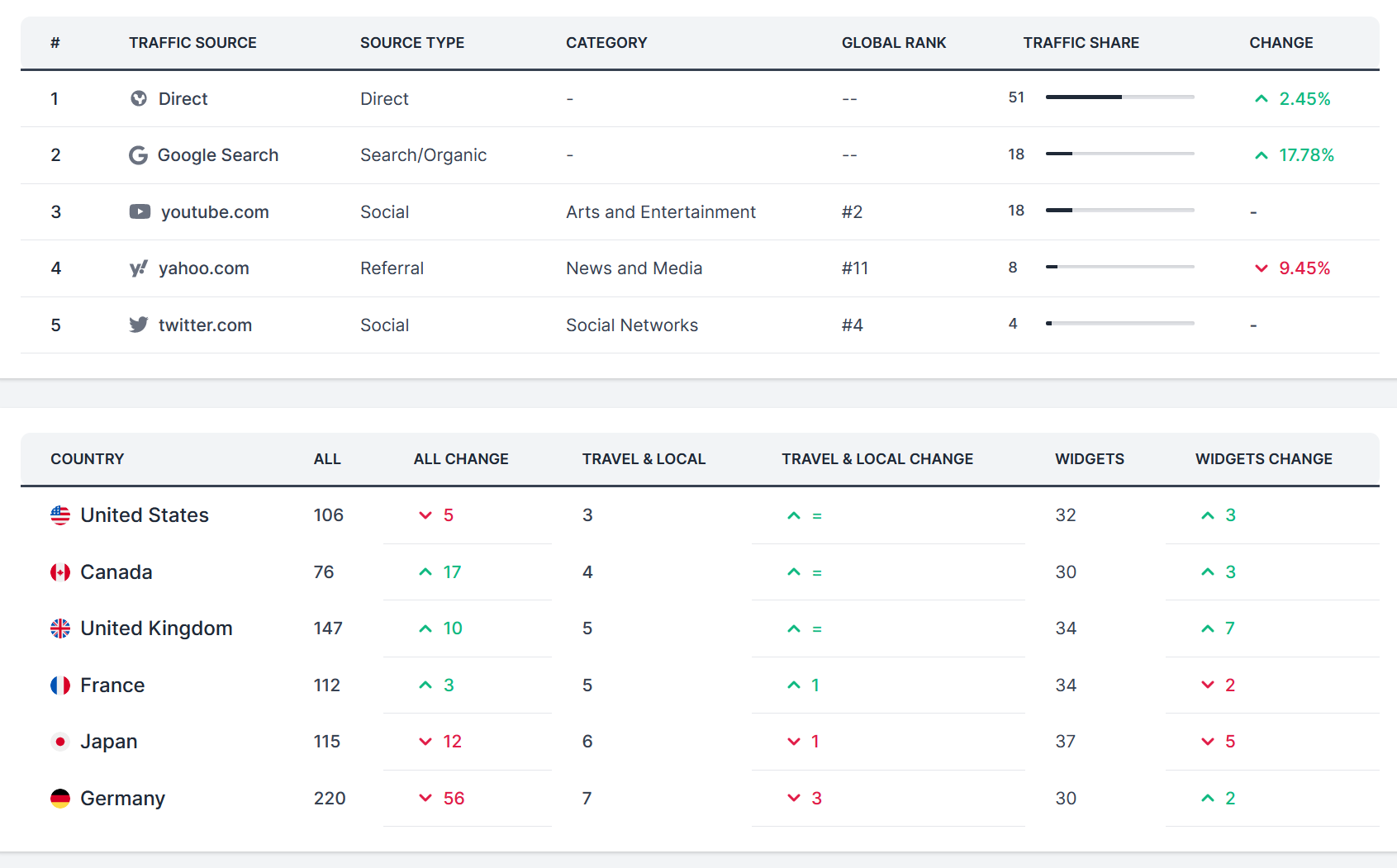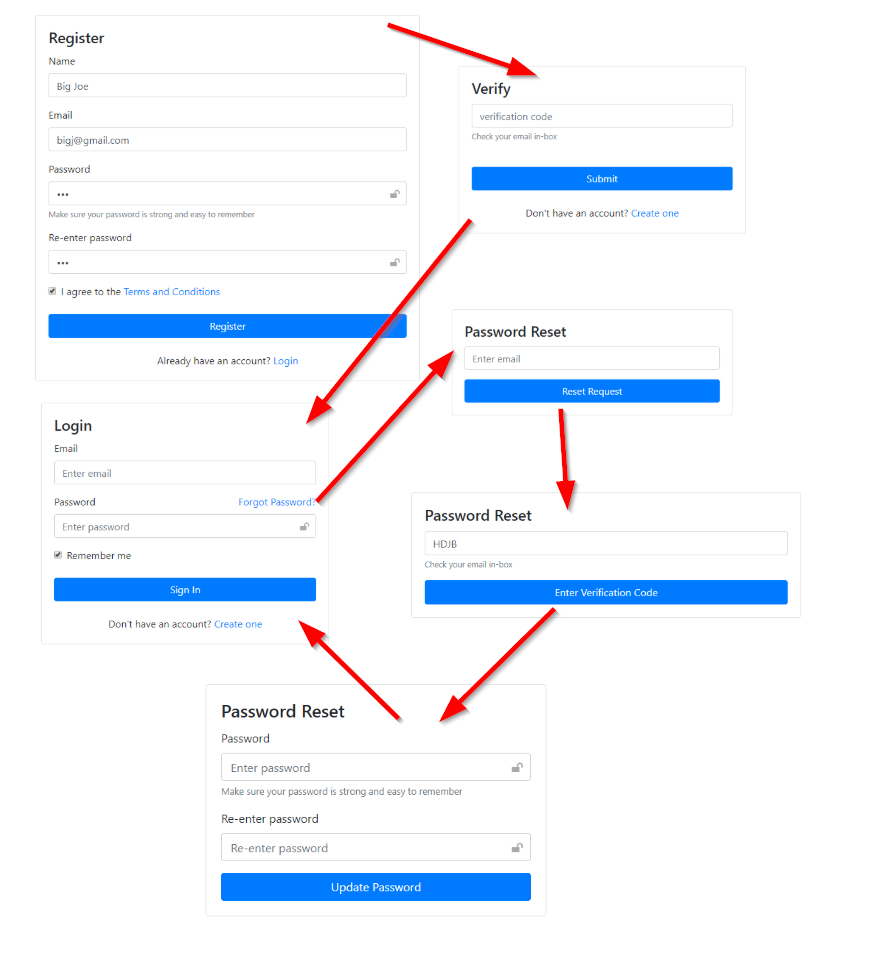Dash Pages SPA Framework
Project description
dash-spa
DashSPA is a component and suite that allows you to build complex Plotly/Dash based multi-page applications with ease. The demo application includes several well known Dash demos that have been pasted into the SPA framework to show how easy it is to transition to SPA.
To appreciate what you can do with DashSPA take a look at dash-flightdeck.
Code Snippet
pip install dash-spa
from dash import html
import dash_bootstrap_components as dbc
from dash_spa import DashSPA, page_container, register_page
from server import serve_app
app = DashSPA(__name__,external_stylesheets=[dbc.themes.BOOTSTRAP])
def big_center(text):
className='display-3 text-center'
return html.H2(text, className=className)
def page_layout():
return big_center('Simple Page Example')
page = register_page("test.page1", path='/page1', title='Page1', layout=page_layout)
if __name__ == "__main__":
app.layout = page_container
serve_app(app, debug=False, path=page.path)
DashSPA manages component IDs using page namespaces. This greatly reduces Dash component ID conflicts. A component ID is only ever defined once when the component is created. It is then used by reference in associated Dash callbacks:
from dash import html
import dash_bootstrap_components as dbc
import dash_holoniq_components as dhc
from dash_spa import register_page, callback
page = register_page(__name__, ...')
user_name = dbc.Input(id=page.id('user'), placeholder="Enter name")
password = dhc.PasswordInput("Password", name='password', id=page.id('password'), placeholder="Enter password")
btn = html.Button('Enter', id=page.id('enter'), disabled=True)
@callback(btn.output.disabled, user_name.input.value, password.input.value)
def _cb_enter(user_name, password):
return not db_validate_user(user_name, password)
DashSPA Defines a state/event pattern where a state Context is wrapped by a @Context.Provider. Dash callback events update the contexts' state which triggers the method decorated by the active @Context.Provider. The decorated method then updates the UI based on the new context state.
A context can have any number of @Context.Providers. This pattern makes it possible to create generic Dash components that communicate with host application via ContextState.
ContextState can, if required, have session persistence.
Example usage:
@dataclass
class ButtonState(ContextState):
clicks: int = 0
ButtonContext = createContext(ButtonState)
def Button(id):
state = ButtonContext.getState()
btn = html.Button("Button", id=id)
@ButtonContext.On(btn.input.n_clicks)
def btn_click(clicks):
state.clicks += 1
@ButtonContext.Provider()
def layout():
state = ButtonContext.getState()
btn = Button(id='test_btn')
return html.Div(f"button pressed {state.clicks} times!")
DashSPA Tables
It's easy it create great looking tables with optional search and pagination. Table cells can contain text and active components. Table, search and pagination layout is completely flexible.
Tables are defined in a few lines:
def create_table(id):
state = TableContext.getState()
df1 = filter_str(df, state.search_term)
ordersTable = OrdersTable(
data=df1.to_dict('records'),
columns=[{'id': c, 'name': c} for c in df.columns],
page = state.current_page,
page_size = state.page_size,
id=id
)
return ordersTable
Tables are customised by creating a custom tableRow method for the table:
def tableRow(self, index, args):
name, views, value, rate, change = args.values()
icon = UP if change == "Up" else DOWN
return html.Tr([
html.Th(name, className='text-gray-900', scope='row'),
html.Td(views, className='fw-bolder text-gray-500'),
html.Td(value, className='fw-bolder text-gray-500'),
html.Td([
html.Div([
icon,
rate
], className='d-flex')
], className='fw-bolder text-gray-500')
])
DashSPA Allows easy creation of interactive forms
from dash_spa import SpaForm, isTriggered
frm = SpaForm('loginFrm')
email = frm.Input('Email', name='email', type='email', placeholder="Enter email")
password = frm.PasswordInput("Password", name='password', placeholder="Enter password")
button = html.Button('Sign In', type='submit')
form = frm.Form([
email,
password,
button,
], title='Sign In'),
@app.callback(form.output.children, form.input.form_data)
def _form_submit(values):
if isTriggered(form.input.form_data):
print(values)
return spa.NOUPDATE
DashSPA Supports page containers.
Page containers define markup wrappers for page content. This allows layout themes to be created. In DashSPA all pages are rendered in a default container but only if one has been defined. If a default container is not defined the page is rendered raw.
To define a default container, in any module in the ./pages folder:
/pages/<any_module>.py
from dash import html
import dash_spa as spa
# Example DashSPA container
def my_container(page, layout, **kwargs):
try:
# Page to be rendered
CONTENT = layout(**kwargs) if callable(layout) else layout
# Return the container markup with the content embedded
return html.Div([
MY_NAVBAR(),
html.Br(),
html.Div([
html.Div([
html.Div([], className="col-md-1"),
html.Div(CONTENT, className="col-md-10"),
html.Div([], className="col-md-1")
], className='row')
], className="container-fluid"),
MY_FOOTER()
])
except Exception:
page = spa.page_for('pages.not_found_404')
return page.layout()
spa.register_container(my_container)
Any number of containers can be defined. To use an alternative container simply register the page specifying the container to use:
register_page(__name__,..., container='admin')
DashSPA Has a server-side session data cache. Back ends are available for diskcache and REDIS.
The shape of session data is defined using dataclasses.
@session_data()
class ButtonState(SessionContext):
clicks: int = 0
ctx = session_context(ButtonState)
ctx.clicks += 1
Any number of session data objects can be defined.
Login Manager
DashSPA Includes an optional LogninManager that supports user registration, email
authentication and login. This is provided as a demonstrator, careful consideration
to the security implications should be undertaken before using it in a public website.
Views are provided that allow:
-
Register, name, email, password. Verification code send by email.
-
Enter the email verification code.
-
Normal user login.
-
Reset forgotten password, Password reset code sent by email.
-
Enter password reset code.
-
Enter new password, confirm new password.
-
Login using new password.
-
User admin table with Add, Edit and Delete. Accessible only when signed in with admin rights.
Documentation
Head over to the README for more details.
Contributing
The source code for dash-spa is available on GitHub. If you find a bug or something is unclear, we encourage you to raise an issue. We also welcome contributions, to contribute, fork the repository and open a pull request.
Project details
Release history Release notifications | RSS feed
Download files
Download the file for your platform. If you're not sure which to choose, learn more about installing packages.
Source Distribution
Built Distribution
Filter files by name, interpreter, ABI, and platform.
If you're not sure about the file name format, learn more about wheel file names.
Copy a direct link to the current filters
File details
Details for the file dash-spa-1.1.5.tar.gz.
File metadata
- Download URL: dash-spa-1.1.5.tar.gz
- Upload date:
- Size: 65.0 kB
- Tags: Source
- Uploaded using Trusted Publishing? No
- Uploaded via: twine/3.7.1 importlib_metadata/4.12.0 pkginfo/1.8.3 requests/2.28.1 requests-toolbelt/0.9.1 tqdm/4.64.0 CPython/3.8.13
File hashes
| Algorithm | Hash digest | |
|---|---|---|
| SHA256 |
4650da6ddf1c0c42d971660c30c74c2f53e70a644474a81d7146a1e6ee21742a
|
|
| MD5 |
3a56318efc9acce1e21077020dae23c2
|
|
| BLAKE2b-256 |
72f091a84636200b360762b5d5402e67c0b8fce40c081ce98fbc196ab19fea82
|
File details
Details for the file dash_spa-1.1.5-py3-none-any.whl.
File metadata
- Download URL: dash_spa-1.1.5-py3-none-any.whl
- Upload date:
- Size: 78.7 kB
- Tags: Python 3
- Uploaded using Trusted Publishing? No
- Uploaded via: twine/3.7.1 importlib_metadata/4.12.0 pkginfo/1.8.3 requests/2.28.1 requests-toolbelt/0.9.1 tqdm/4.64.0 CPython/3.8.13
File hashes
| Algorithm | Hash digest | |
|---|---|---|
| SHA256 |
44afc3e04e1785c3dd514120fa53996d2fe36f48ef3cac12fe121324ef68c30b
|
|
| MD5 |
bb5c09589fbe3fa37b1f9bc0e89c3781
|
|
| BLAKE2b-256 |
2f981065e3ecaa44e42b8c24f8c1e560d042186c2ef52b52a4bdb145f1e46821
|















